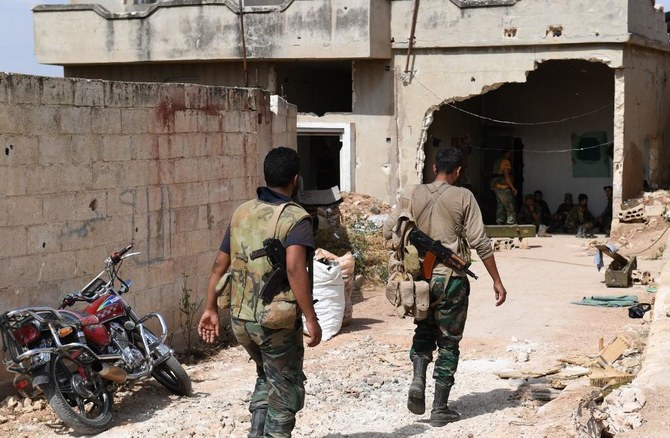BEIRUT, ANKARA: Regime forces and allied Syrian fighters were locked in clashes on Thursday on the edge of an opposition bastion in northwest Syria after an opposition-led advance that killed 71 fighters overnight, a monitor said.
Russian and regime aircraft have ramped up their deadly bombardment of the Idlib region — administered by Syria’s former Al-Qaeda affiliate Hayat Tahrir Al-Sham (HTS) — since late April, despite a months-old international truce deal.
Clashes have also raged on the edges of the region, including in the north of Hama province.
Late Wednesday, HTS and allied opposition fighters took control of Hamameyat village and hilltop, in clashes that killed 41 regime troops and 30 opposition fighters, the Syrian Observatory for Human Rights said.
“The fighting is ongoing as regime planes and artillery pound the area,” the head of the Britain-based monitor Rami Abdel Rahman said on Thursday morning.
HTS spokesman Abu Khaled Al-Shami said the militant and opposition fighters attacked after dark, taking control of the “heavily fortified” hill from forces loyal to Syria’s Bashar Assad.
Naji Mustafa, a spokesman for the allied National Liberation Front fighters’ grouping, said: “The hill is very strategic because it overlooks ... supply routes to enemy forces.”
Russian airstrikes killed one civilian in the town of Latmaneh and opposition artillery fire took the life of one woman in the regime-held area of Karnaz, the Observatory said.
A September deal between Russia and opposition backer Turkey was supposed to avert a massive regime offensive on Idlib, but it was never fully implemented and HTS took full administrative control in January.
More than 560 civilians have been killed in regime and Russian airstrikes on northwest Syria since the end of April, according to the Observatory.
Opposition fire during the same period has killed more than 40 civilians in adjacent regime-held areas, it has said.
Blast kills 13
In another development, a car bomb exploded on Thursday at the entrance to a northern Syrian town controlled by Turkish forces and allied Syrian fighters, killing at least 13 people including eight civilians and wounding 35, a war monitor said.
Turkish troops and their Syrian proxies took control of Afrin from Kurdish forces in March last year after a two-month air and ground offensive.
“The car bomb exploded near the checkpoint at the entrance to the town where vehicles were gathering to be checked,” the Britain-based Syrian Observatory for Human Rights said.
Those killed also included four fighters and an unknown person, the Observatory said.
“Among the victims, at least six are originally from Eastern Ghouta,” a former opposition stronghold outside Damascus retaken by the regime last year, Observatory chief Rami Abdel Rahman said.
There was no immediate claim for the blast, which is the latest deadly explosion to rock the city.
The state-run Anadolu Agency said the bomb in a fuel truck exploded in Afrin, igniting a fire and causing considerable damage to the surrounding area.
Afrin operation
Turkey and allied Syrian fighters took control of Afrin last year in a military operation that expelled local Kurdish fighters and displaced thousands of Kurdish residents. Ankara considers the Kurdish fighters who were in control of Afrin terrorists. Since then, there have been a series of attacks on Turkish targets in the area.
Turkey supports the Syrian opposition in the war against Assad but has joined with Russia to secure and monitor local cease-fires. Turkish troops have also crossed into Syria in recent years to battle Kurdish fighters and Daesh militants operating along the border, setting up bases in the area.
The civil war that has raged for eight years has killed more than 450,000 people and uprooted more than half of Syria’s population. The Syrian regime has regained control of more than 60 percent of the territory once in the hands of armed groups and militants.
In northwestern Syria, where the fighters have their last stronghold and where nearly 3 million civilians live, regime forces have been pushing their way in to at least restore their access to a strategic highway in the area. Despite a Turkey and Russia-backed cease-fire, fighting has raged since late April, displacing hundreds of thousands and killing hundreds.
On Thursday, the White Helmets said at least five people were killed in air raids on residential areas in the town of Jisr Al-Shughur, southwest of Idlib. The Observatory put the death toll at three, with eight injured.
The regime troops are fighting to regain control of a village they lost to the opposition earlier this week.






















